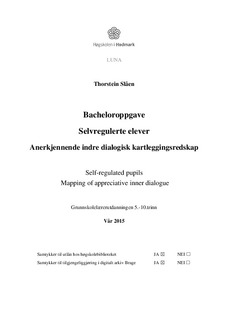Selvregulerte elever – Anerkjennende indre dialogisk kartleggingsredskap.
Bachelor thesis

Åpne
Permanent lenke
http://hdl.handle.net/11250/2358036Utgivelsesdato
2015Metadata
Vis full innførselSammendrag
Norsk:
Med en antakelse om at skolen legger for ensidig vekt på kognisjonssiden i
selvreguleringen hos eleven, ble problemstillingen for oppgaven utformet: På hvilken måte
kan elever kartlegge, og læreren legge til rette for elevers selvregulering med vekt på
emosjoner?
Det har i dette kvalitative fenomenologiske studiet vært forsøkt arbeidet med utvikling og
implementering av et kartleggingsverktøy for selvregulering med vekt på emosjoner.
Kartleggingsverktøyet har fått navnet «følelsesregistrering» og har tatt formen som en
matrise med vekt på åpne, metakognitive og fremtidsrettede veiledningsspørsmål. Tanken
bak oppbyggingen er at elevene skal komme i en anerkjennende indre dialog med de ulike
reguleringsformene; Emosjon, kognisjon og handling, gjennom separering og samordning.
Indikatorer som jeg har sett på som høy grad av selvregulering knytter seg til hyppighet,
forandring, nyanser og språklig uttrykksmåte i forhold til følelser. Videre vil også
attribusjon, unnvikelsesstrategier og utholdenhetsstrategier stå sentralt med tanke på de to
andre reguleringsformene. English:
My assumption is that the schools unilateral focus in self-regulation has been cognition. That is why I come up with this main topic question: Who can the learners identify, and the teacher accommodates the pupils’ self-regulation with an emphasis on emotions?
It has in this qualitative phenomenological study tried been developed and implemented a mapping for self-regulation with an emphasis on emotions. The mapping has been named “følelsesregistrering” and look like a matrix with the main focus open, metacognitive and future guiding questions. The idea behind the structure is that students should get an appreciative inner dialogue with the various forms of regulation; Emotion, cognition and action, through separation and coordination. Indicators that I've seen as high degree of self-regulation relating to frequency, change, nuances and linguistic expression in relation to emotions. Furthermore, also attribution, avoidance coping and endurance strategies prominently considering the other two forms of regulation.
Beskrivelse
Bacheloroppgave, grunnskolelærerutdanning, 2015.